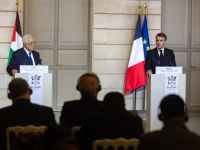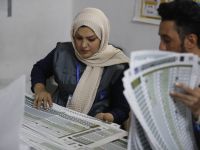Albawaba.com
Amman
The Palestinian National Authority had to borrow 100 million shekels ($25m approximately) from the Arab Bank to make up for a balance deficit and pay the October salaries of its employees, according to Palestinian Minister of Industry Sadi El Krunz.
The minister told Albawaba.com in a telephone interview on Monday that salary expenditures take up 82 percent of the PNA budget. He attributed the deficit to the current developments in the Palestinian territories, saying that Israel is imposing an economic siege on the Palestinians.
“The PNA revenues have decreased sharply since the outbreak of the Intifada, with a daily direct economic loss estimated at $13m,” the top official said.
He said the embargo has completely paralyzed the export-import movement, adding that there are 2800 containers imported by Palestinians held in Israeli ports, in addition to four cargo ships still waiting with a cement consignment on board.
What worsened the situation, according to Krunz, is the closure of the borders with Jordan and Egypt by the Israeli authorities.
“The trade exchange has not been frozen only externally, but the transport of goods between Gaza and the West Bank on the one hand, and between Palestinian towns on the other has been also blocked under the siege,” he said.
Much damage to the Palestinian economy under the circumstances has been done as 125,000 Palestinians who work in Israel are banned from going to work due to the closure of the territories, Krunz added.
The Palestinian official called on the Arab countries “to move fast to save the Palestinian economy and help sustain the Intifada of the Palestinian people.”
He demanded that Arabs “give direct financial aid to the Palestinian authority so that it could meet its commitments towards its people.”
More measures need to be taken by the Arab states if they want to give a helping hand to the Palestinian economy including opening up their markets to Palestinian products and investing in infrastructure projects in Palestine, said the minister, adding that the surplus in Palestinian workforce should be absorbed by Arab countries.
Regarding the billion dollar Jerusalem and Aqsa funds proposed at the October 21-22 Arab Summit to help the Palestinians, Krunz said that no mechanisms have been set so far to put the plan into effect.
The Palestinian official criticized Egyptian columnists who attacked the Palestinians at a time when all efforts are needed to support the people in their struggle for independence.
Citing columnist Sameer Rajab’s description of the Palestinians as “ungrateful people,” Krunz said that for such accusations to come under the present conditions indicates that these journalists are incited by Israel and the US to do what they are doing.
© 2000 Al Bawaba (www.albawaba.com)







